Thursday, 31 July 2025, 22:47
Spain’s BOE official state gazette this week published a list of 21 new municipalities that are applying for ‘stressed zone’ status as described in the Housing Act (Ley de Vivienda), approved by central government in 2023.
Among the cities in question are provincial and regional capitals such as San Sebastian, Pamplona and La Coruña. The inclusion of the Galician capital also represents the first case of a region governed by the Partido Popular (PP) making use of this mechanism. Bear in mind that a ‘stressed zone’ – an area where housing supply is stretched – applies to specific municipalities, but it is the autonomous regions that must request this tool to ease the problem.
Housing minister Isabel Rodríguez took advantage of this situation to call on Andalucía to follow suit and declare areas that are under such housing pressure. She cited Malaga as a concrete example, describing the capital of the Costa del Sol as “one of the most difficult areas in the country” for accessing housing. Once a municipality is declared a stressed area, a new regulatory framework for rentals comes into play. Small landlords taking on a new rental contract must maintain the previous rental price, regardless of the annual rent adjustment procedure.
For new contracts, Spain’s housing ministry offers a range of rental prices that vary by city. Rent increases, up to a maximum ceiling of 10%, can only be raised if landlords carry out certain renovation work or accessibility improvements. The other option is for landlords to commit to allowing the tenant to stay in the property for 10 years or more. Furthermore, in cities declared as stressed zones, landlords who lower the rent by at least 5% can deduct up to 90% of the taxes they pay on the income earned from that rental.
SUR has consulted various political and social commentators to gather their opinions on the usefulness of declaring Malaga city a stressed area. As expected, there is agreement that the difficulty in accessing housing now represents a veritable social emergency. However, there is disagreement about the usefulness of this mechanism provided for in the Ley de Vivienda statute.
Opinions
The Junta de Andaluía’s delegate in Malaga, Patricia Navarro, rejects declaring Malaga a stressed area and advocates comprehensive measures, taking the view that the rental problem cannot be confined to a specific municipality, but rather that it is affecting the country’s most dynamic capitals. “The seven cities that currently have the greatest housing problems, including Malaga, are the ones that account for 40% of Spain’s GDP. The [central] government should mobilise exceptional funds to build more affordable housing,” said Navarro.
According to Navarro, the implementation of a stressed zone in Malaga would worsen the situation. She asserts that “the statute on housing has acted as a barrier to accessing housing and the only young people to have benefited from this law are those who want to occupy a property as a squatter.”
Malaga’s mayor Francisco de la Torre said he is always willing to reflect on the implementation of measures that could facilitate access to housing. When questioned by SUR, he made it clear that his rejection of declaring the provincial capital as a stressed area is not motivated by partisan reasons.
To date, De la Torre said he simply does not see the point. “We don’t see any positive effects that would make it worthwhile to declare this issue. In Barcelona, there is enormous difficulty in renting a home. For every apartment offered, more than 340 people are on the waiting list. We also have difficulties, but not as many. Barcelona is under more duress and doesn’t want to be. We will continue to monitor the issue, but we don’t see it being of any use. The solution is legal frameworks that increase housing supply. Everything else is just pie-in-the-sky thinking. If supply is reduced to such an extent, what solution has been found in Barcelona?”
Contrasting messages are coming from the opposition groups. PSOE and Con Málaga advocate for the immediate declaration of Malaga as a stressed zone. Spokesperson for the socialists in Malaga city hall, Dani Pérez, directly criticised Junta president Juanma Moreno. “He has a very clear plan in terms of housing: to continue speculating, show insubordination by breaching the Ley de Vivienda, fail to fulfil his responsibilities, not build VPO [social housing] and take no action regarding tourist housing”, he says.
Speaking to SUR on behalf of local, independent party Málaga para Vivir, Kike España believed there is no room for doubt that Malaga should have been declared a housing crisis area from the moment the national housing law came into effect. “What we’ve seen now from the city council is just patching over the problem. Measures that serve no purpose because they do not address the root of the problem. Housing must be for living, not for doing business”, he said.
A profound reflection
Following the housing minister’s comments on Tuesday, it was then the turn of the secretary of state for housing to raise his voice on Wednesday. David Ramos called on Malaga’s mayor, Francisco de la Torre, and Junta president, Juanma Moreno, to reflect deeply on the rental situation in the Costa del Sol capital. “Malaga is one of the most stressed cities in Europe,” he stated in an interview with Cadena Ser.
Lastly, SUR sought the opinion of Patricio Palomar, real estate expert and director of alternative investments at Aire Partners. Palomar is opposed to intervention in the rental market. He is unaffected by ideological issues, simply arguing that experience has shown that it doesn’t work. “A rent cap was introduced in Berlin in 2021. Four years later, it’s widely acknowledged that it hasn’t served as a solution to the problem,” he noted.
Palomar cited Austria as an example and believes it is the country with “the best system.” He added: “The reason is simple. Austria has a huge stock of publicly-owned housing. Virtually all strata of society have access to this housing at a rental price that depends on their income.”

